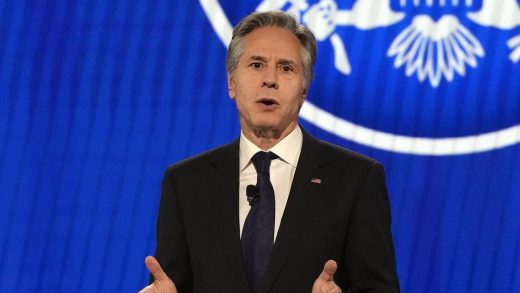
UNITED NATIONS (AP) — The U.N. Security Council lifted a requirement that the Central African Republic get advance U.N. approval for arms purchases and transfers for its security forces, but kept an arms embargo on mercenaries and all other armed groups despite vehement opposition from the country’s government.
The resolution ending all restrictions on arms for the government was approved by a vote of 13-0 with Russia and China abstaining.
Mercenaries from Russia’s Wagner Group have been working in the Central African Republic, known as CAR, at the government’s request, and until the vote was taken most diplomats were uncertain whether Russia would veto the resolution or abstain.
CAR’s Foreign Minister Sylvie Baïpo-Temon told the council after the vote that the arms embargo, which was imposed in 2013, should have been lifted in its entirety. She called the resolution “one of flagrant double standards,” intimating it was the work of Western power blocs.
“This injustice is feeding not peace but insecurity and disorder in the Central African Republic and the world,” Baïpo-Temon warned.
The mineral-rich but impoverished Central African Republic has faced deadly intercommunal fighting since 2013, when predominantly Muslim Seleka rebels seized power and forced President Francois Bozize from office. Mostly Christian militias later fought back, also targeting civilians in the streets. Untold thousands were killed, and most of the capital’s Muslims fled in fear.
A peace deal between the government and 14 rebel groups was signed in February 2019, but violence erupted after the constitutional court rejected Bozize’s candidacy to run for president in December 2020. President Faustin Archange Touadera won a second term with 53% of the vote, but he continues to face opposition from a rebel coalition linked to Bozize. Touadera brought in Wagner mercenaries who have helped keep him in power.
The Wagner Group, whose leader Yevgeny Prigozhin briefly threatened Russian President Vladimir Putin last month when he led his fighters from Ukraine toward Moscow, has expanded Russia’s influence in Africa. Its fighters have also brutalized civilians in CAR, Mali and elsewhere to crush dissent and fend off threats to their leaders’ power.
The resolution adopted Thursday doesn’t mention Wagner by name but it condemns cross-border criminal activities, the illicit transfer of small arms and light weapons that threaten peace and security in CAR, and “the use of mercenaries and violations of international humanitarian law and human rights violations perpetrated by them.”
It maintains the arms embargo on mercenaries and armed groups until July 31, 2024, and extends the mandate of the panel of experts monitoring implementation of sanctions in CAR until Aug. 31, 2024.
U.S. deputy ambassador Robert Wood told the council after the vote that the resolution “will help keep dangerous weapons and resources from reaching armed groups.”
While the United States acknowledges CAR’s call to fully lift the arms embargo, Wood said, Washington remains concerned at the security situation in the country and notes that the government has not met benchmarks for the embargo to be lifted. He said further efforts are needed to strengthen CAR’s management of weapons stockpiles and to address cross-border smuggling of arms and natural resources.
Wood said the United States is also “increasingly alarmed” by reports that shoulder-fired surface-to-air missiles known as MANPADS have been transported by the Wagner Group through CAR to Sudan where the country’s military and paramilitary have been fighting since mid-April.
Under Thursday’s resolution, Wood said, “Russia remains obligated” to inform the Security Council sanctions committee “of all transfers of weapons and resources to its Wagner mercenaries,. He stressed that failure to do so will violate sanctions.
Russia’s deputy U.N. ambassador Dmitry Polyansky said Moscow had urged the council to lift the arms embrgo on grounds that it is hindering the government’s efforts to combat illegal armed groups and isn’t preventing the supply of arms to fighters. He expressed regret that the views of CAR and other council members were not accepted.
“It is no secret to anyone that sanctions regimes are used by some states as a lever to exert political pressure under the umbrella of the U.N. and international umbrella,” he said. “We do not believe that this approach is constructive.”


